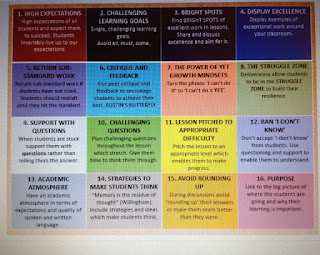1Interleaved Learning (JLi)
·
Teaching can become quite episodic whereby each
topic is taught in turn and then not revisited until revision. With interleaved
learning, the attempt is to try to build on learning rather than have blocked
learning - ABC ABC ABC rather than AAA BBB CCC
·
New syllabus more likely to require students to
mix skills together than have blocked learning
·
Evidence suggests students achieve better as a
result
·
Use starters as a way to recap from several
weeks ago - Corbettmaths
·
Video - Robert Winston synapses. Learning
something is difficult at first but as the signals pass again and again a more
solid pathway is produced.
·
DO shared some thoughts from Professor Coe on
this regarding recall. If one wants students to remember things from some time
ago, one has to require them to do so in order to set this expectation. If we
teach in an episodic/modular way then that’s how they will learn.
3
Challenge Strategies(JCD)
·
Jason shared 3 strategies that he has used with
his classes to promote challenge
1.
Worksheets where the challenges built in to
tasks immediately - each question has a challenge rather than an extension at
the end of the sheet. More students engage with these challenges as they happen
at the time.
2.
CO2 cycle - rather than a cycle to learn by rote,
JCD reads out text and pupils record what happens in their own way without
using words, then has to explain their diagram etc to pupil B
3.
Gut glucose transport - rather than exposition,
gave students a blank diagram and some facts as a challenge to try and describe
it the self - scaffold present where necessary.



